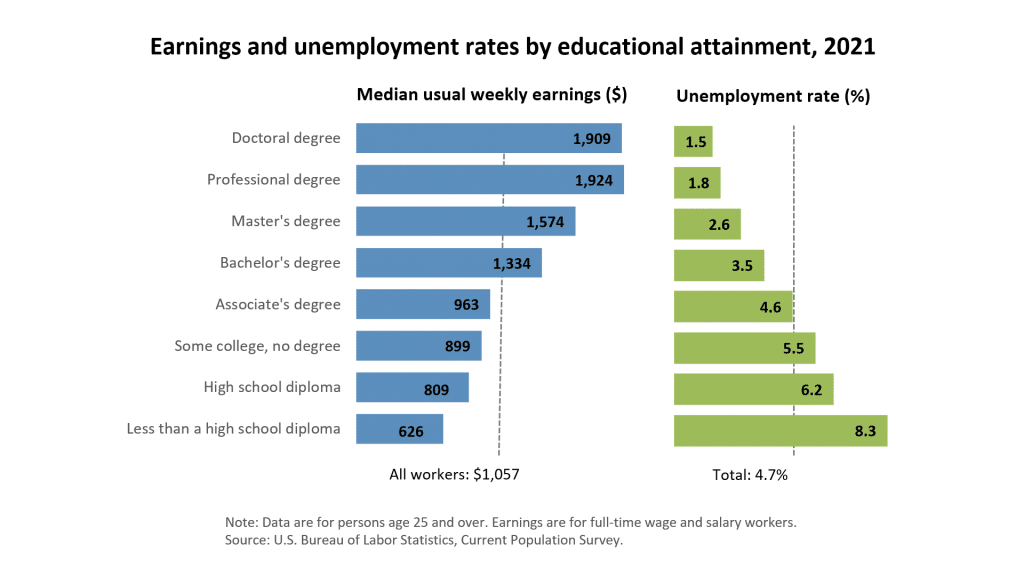
Can You Get a Ph.D. Without a Master’s?
So, you’ve completed your bachelor’s degree and want to get on the fast track to a Ph.D. The question is—can you get your Ph.D. without a master’s degree? Or, is a combined master’s and doctoral program an option? The answer to both questions is, yes! There are options where a freshly minted bachelor’s degree graduate can enter a combined master’s and doctoral program and sail out with a terminal degree. Now that we have the main questions answered, let’s dive into the details.
Why pursue a doctoral degree?
According to the U.S. Bureau of Labor Statistics, the median weekly earnings of individuals with a doctoral degree was the second highest in 2021, at $1,909 (which is approximately $99,535 a year). This was just a shade lower than the weekly earnings of people with a professional degree. Professional degrees generally include certain degrees in law, the medical field, and more.
While earnings with a doctoral degree were the second highest, unemployment rate was the lowest. Not only does a doctorate establish your reputation as an expert in your field, it pays accordingly.

Master’s and Doctorate Combined Programs
What is the advantage of a combined master’s and doctorate program? Or, of a doctoral program with a nested master’s? Time.
In such programs, you work seamlessly toward your doctoral degree without wasting time in between. It can usually take months to select, apply for, be accepted in, and then begin a doctoral program. But if you get into a reputable combined program straight after college, you can simply subtract the transition gap from the equation. That means graduating earlier with a terminal degree, and applying for higher paying positions, higher education jobs, or research positions.
If you’re interested in psychology, Regent University offers an APA-accredited Psy.D. in Clinical Psychology program. It is a five-year program and students apply for internships in the fourth year. These are competitive internship positions that provide real-world experience, equipping students for future employment. Regent’s Psy.D. students have had a 100% internship match rate for six consecutive years (2016-2021), which means all the students who applied for internships ended up gaining them. Moreover, from 2019-2021, all these were APA/CPA-accredited internships.
As an APA-accredited doctoral program in clinical psychology, Regent’s Psy.D. is designed to fulfill the typical training program requirements for licensure as a psychologist in various U.S. and Canadian jurisdictions. “Regent trained me really well as a clinician in getting the types of clinical experiences that I needed and in building relationships,” said Madison Simons, a Psy.D. graduate who is a staff psychologist at Cleveland Clinic’s Digestive Disease and Surgery Institute and one of a handful of GI psychologists in the country.
Importantly, you don’t need a master’s degree to apply for the Psy.D. program. In fact, most of the students enrolled in Regent’s Psy.D. in Clinical Psychology do not hold master’s degrees. The admission requirement is a completed four-year bachelor’s degree from a post-secondary institution with state and regional accreditation. Regent provides a supportive environment that focuses on equipping you to excel in your career and calling. “I felt known as a person and invested in for who I was,” added Simons.
Are there other combined master’s and doctoral programs?
There are. Regent offers a Ph.D. in Government with a nested master’s degree at the Robertson School of Government. It is also the first of its kind to offer an online course experience, with a residency. You can select a minor concentration and a major concentration that aligns with your interests and career goals from the following options: American politics, comparative politics, international relations, and policy analysis.
“The nested M.A. is a recognition that Ph.D. students who complete their coursework have done the full coursework that an M.A. student should, and we want to recognize that achievement,” said Dr. Hastey, Assistant Professor, Robertson School of Government. What does a Ph.D. with a nested master’s degree imply? It means that a student who has completed 33 credit hours of Regent’s Ph.D. in Government program (including core courses) and needs to leave due to extenuating circumstances can apply to receive their master’s degree.
Why pursue a combined master’s and doctoral program at Regent University?
At Regent, you align yourself with excellence. The university has been ranked among top national universities by the U.S. News & World Report for four years— 2019, 2020, 2022, and 2023. It is transfer friendly, allowing you to transfer up to 90 credit hours. You can transfer up to 75% of your bachelor’s degree or 50% of your graduate degree.
Moreover, Regent is located close to Naval Station Norfolk, the world’s largest naval station, and has consistently been recognized as a military-friendly school. It was ranked as a Top10 Military Friendly® School in the “private offering doctorate” category by Military Friendly®, 2023-24.
Taught from a Christian worldview, Regent University’s programs are developed to make you practice ready and purpose driven. So come, explore the difference.

